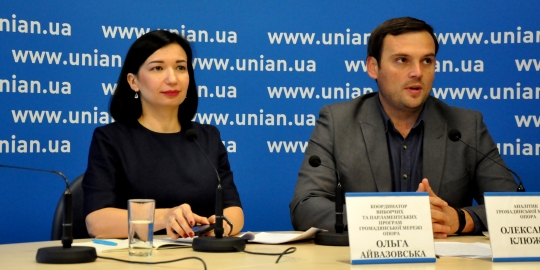The number of election law violations, committed during the formation of election commissions and their first meetings, was not high, according to the Civil Network OPORA. At the same time, the lack of coordination between the Law of Ukraine on Local Elections and other laws of Ukraine caused complications in a number of important procedures.
The first local elections in 201 united territorial communities will be held on 29 October 2017. The election process has officially started on 9 September in all Ukrainian oblasts without exception. Dnipropetrovsk and Volyn oblasts have the largest number of united communities participating in the election – 19 communities each. In Zakarpattia and Mykolaiv oblasts, on the contrary, have only one community each.
The election process is being held in 25 city communities, 115 village communities, and 61 settlement communities. 674 councilors will be elected in 25 cities. In settlements and villages, for their part, 3,832 councilors are going to be elected. Besides that, each city, village, and settlement will get their city, village and settlement heads elected (201 offices in total).
OPORA's observers will secure an independent non-partisan observation of the first local elections in united territorial communities. The organization has deployed 69 long-term observers to the territorial communities, and short-term observers will join them right before the voting begins.
OPORA's observers have paid special attention to the formation of territorial election commissions in September, as well as the beginning of their activities. Civil Network OPORA hasn't noticed much violations of the election process during the nomination of candidates for members of TECs by local party cells, drawing procedure, and formation of the commissions. The detected violations concerned specific TECs and were neither wide-scale, nor typical.
Expectedly, most of the candidates for TEC members were nominated by parliamentary parties (80%). Thus, local cells of the Petro Poroshenko Bloc “Solidarity” and AUU Batkivshchyna have submitted the biggest number of candidates. Moreover, these parties nominated their representatives to almost each TEC. Local cells of parliamentary parties Opposition Bloc and Samopomich Union submitted the smallest number of candidates, and covered only 45% of TECs. Judging from the activeness of political parties in nomination of TEC members, we may say their interest in holding election campaigns differs from region to region.
According to OPORA's calculations, all local party cells without exception have nominated around 2950 candidates for members of TECs. Besides that, there were no wide-scale rejection of nominees by raion election commissions. However, OPORA's experts state that law-enforcement bodies should learn in detail the information about forgery of signatures in documents, proving the readiness of citizens to take part in activities of an election commission, representing the certain local party cell.
Besides that, OPORA gathered information about the first meetings of 195 of 201 territorial election commissions, where the first local elections are going to be held in autumn. Thus, almost all election commissions (97%) conducted their first meetings with oath-taking in line with time constraints established by the legislation. According to the observers, only 6 TECs (3% of the total number) conducted their first meetings after the deadline, 18 September, due to a low organizational capacity. Thus, these election commissions were the following: Sokolivske village united territorial community, Kurne village united territorial community (both in Zhytomyr oblast), Fursy village united territorial community (Kyiv oblast), Yuriivka settlement united territorial community (Dnipropetrovsk oblast), Rososha village united territorial community and Stara Pryluka village united territorial community (both in Vinnytsia oblast).
OPORA's observers didn't notice any unauthorized persons, particularly officials and employees of public administration bodies or representatives of political parties (not commission members), on the first members of territorial election commissions. There was no pressure upon members of TECs by representatives of local self-government or state authorities.
Administrative courts have considered 4 cases against decisions, actions and inaction of territorial election commissions, since the beginning of the election process. It should be mentioned that the courts correctly applied substantive and procedural law when considering these cases.
According to OPORA's analysts, the lack of coordination between the Law of Ukraine on Local Elections and other laws of Ukraine caused complications in a number of election administration procedures. For example, the law on formation of territorial communities says it's possible to unite communities, which belong to different raions. However, the needed amendments to electoral legislation, regulating this processes, were not adopted. As a result, the electoral legislation doesn't explain which raion local party cells can nominate the candidates or participate in formation of election commissions in such communities formed of adjacent raions. Such legal uncertainty in fundamental electoral rights and procedures may not only result in violations and complications, but also decrease the social legitimacy of the election process and cause the conflicts.
Based on the interim observation results of the first local elections, scheduled for 29 October 2017, OPORA developed a number of recommendations for the Central Election Commission (to make sure the territorial election commissions apply the electoral legislation equally, establish efficient communication channels with TECs), Verkhovna Rada of Ukraine and VRU committees (to guarantee the legal certainty of electoral process in the first elections in united territorial communities; to focus on their commitments concerning a comprehensive reform and improvement of electoral procedures); territorial election commissions (to prioritize the voting right of citizens) and law-enforcement bodies (to guarantee efficient monitoring and record of electoral violations, to conduct the topic-related trainings for employees).
For comment, please contact:
Olha Aivazovska, Electoral and Parliamentary Programs Coordinator of the Civil Network OPORA
Phone: 063 617 97 50
Oleksandr Kliuzhev, Analyst at the Civil Network OPORA
Phone: 063 844 67 23
(#вибори2017; #elect_ua; #opora; #опора)
Reference:
Civil Network OPORA conducts citizen observation of the first elections in united territorial communities in Ukraine, scheduled for 29 October 2017. 69 long-term observers were deployed to 24 oblasts on September 11. Civic observation conducted by OPORA is a network activity, aimed to provide an impartial assessment of election administration and the voting process, as well as to prevent electoral violations through a comprehensive civic action.
